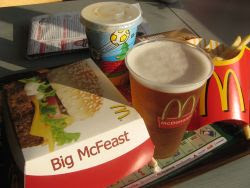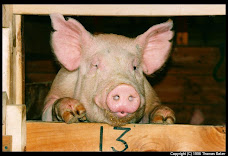
 If there's one thing I can't stand, it's listening to people talk bad about food. I hear it all the time: "You're ordering your pizza with anchovies and pineapple? That's disgusting!", or "You're putting butter on your Pop-Tarts? How gross are you, Brock?" Well excuse me, but last time I checked, food was made to be enjoyed. If I want to slather butter on my Pop-Tarts, pop them in the microwave till their warm and then kick it back with a big glass of whole milk, it's my prerogative!! Sigh. But I digress.
If there's one thing I can't stand, it's listening to people talk bad about food. I hear it all the time: "You're ordering your pizza with anchovies and pineapple? That's disgusting!", or "You're putting butter on your Pop-Tarts? How gross are you, Brock?" Well excuse me, but last time I checked, food was made to be enjoyed. If I want to slather butter on my Pop-Tarts, pop them in the microwave till their warm and then kick it back with a big glass of whole milk, it's my prerogative!! Sigh. But I digress.
Wednesday, February 10, 2010
Different Foods for Different Folks
Not everyone likes the same foods, and marketers have figured out this little secret. International food chains have a long tradition of creating variation in their dishes across nationalities. In fact, some restaurants we have here in America are almost unrecognizable when compared to the same restaurant in other countries! Take McDonald's for example: Their research revealed that their traditional "Big Mac" burger would be extremely unsuccessful in India, specifically because the Hindu majority doesn't eat beef. Instead, they decided to go back to the drawing board to create something new. The result? The Maharaja Mac, a sandwich similar to the Big Mac, but instead of beef, consumers are given the choice of chicken or lamb. Just by doing a little research, they were able to turn a potentially useless product into a huge success!
In Germany, McDonald's decided to take a very uncharacteristic step for their franchise; Beer! In Germany, you can order your Big Mac with a side of fries and a nice cold Budweiser, a trend that would likely never have been accepted over here in the states. Germany has a more relaxed approach towards drinking beer, and the brains over at McDonald's were wise enough to capitalize on the opportunity.
McDonald's isn't the only company differentiating their product to suit local palates; even confection companies like Kit-Kat have thrown their hat into the ring. Kit Kat was quickly accepted in Japan due to the product's resemblance to the Japanese phrase "kitto katsu", which translates to "You will surely win!" in Japanese. Kit Kat released several unique flavor varieties after their initial success in Japan, including maple syrup, melon, vanilla bean, grape, apple, banana, green tea, and cherry blossom. To further their success in Japan, Nestle even created a music label in 2005, and bundled Kit Kats with CD's, which payed off with Kit-Kat's becoming the #1 selling biscuit in Japan.
Differentiating your product and marketing plan for specific audiences is a tried and true method to increasing sales. So when you see me trying to market my buttered Pop-Tarts, keep in mind that while that may sound disgusting to you, they might love that stuff over in the Netherlands.
-Brock Whitfield
Subscribe to:
Post Comments (Atom)


No comments:
Post a Comment